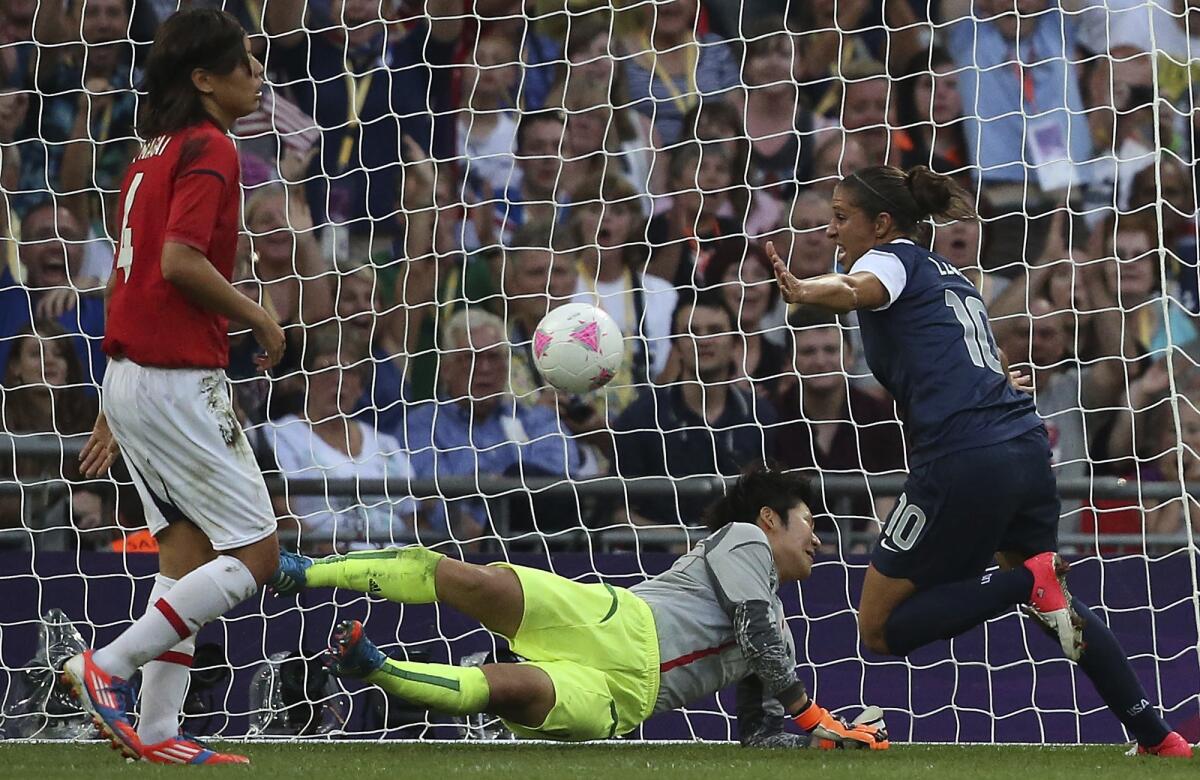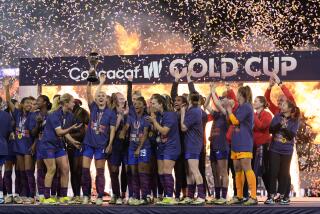Women’s World Cup: Japan keenly remembers 2012 Olympic loss to U.S.

U.S. midfielder Carli Lloyd celebrates after heading the ball past Japan goalie Miho Fukumoto during the London 2012 Olympics womens’ soccer gold medal match at Wembley Stadium.
VANCOUVER, Canada — While the U.S. is using its loss to Japan in the last Women’s World Cup final as motivation heading into Sunday’s rematch, the Japanese are rallying around an even fresher result.
Three years ago the U.S. beat Japan, 2-1, in the gold-medal game of the London Olympics.
“I never forgot the day we played the final in the Olympics” in 2012, captain Aya Miyama, one of more than a dozen Japanese players who will have been in uniform for all three finals, said through an interpreter Saturday. “I wanted the gold medal. The bitter feeling I had back then has stayed with me.”
Yet despite the budding rivalry, the series between Japan and the U.S. has been one-sided with Japan winning just once in 31 games. (The 2011 World Cup final was technically a draw, with the winner decided in a penalty-kick shootout.)
Past results aren’t the only thing the Japanese have used for motivation, though. Four years ago Coach Norio Sasaki showed his players videos of the devastation caused by the massive earthquake and tsunami that hit Japan’s eastern coast four months before the World Cup. And this year the Japanese are rallying around veteran striker Kozue Ando, who suffered a broken ankle 32 minutes into Japan’s first game here, and 36-year-old midfielder Homare Sawa, who, like American Abby Wambach, is her country’s all-time leading scorer and will be playing her final World Cup game Sunday.
“We complete our team only when she’s here. She makes a big difference when she’s here,” Miyama said of Ando, who is expected to return from surgery in Japan to sit on the team’s bench Sunday. In her absence, the team outfitted a white teddy bear in Ando’s No. 7 jersey to take her place on the sideline.
Parrot predictions
Olivia, a 10-year-old African gray parrot who has correctly predicted the outcome of all six of Japan’s games in this World Cup, apparently has forecast that the Japanese — the only unbeaten, untied team in the tournament — will win again Sunday.
The successor to Paul the octopus, who foretold the result of the 2010 men’s World Cup from his tank in a German sea life center, Olivia makes her picks by stepping onto a green mat — artificial turf, like the fields in Canada — and choosing from among three flags, those of the competing teams and one with the FIFA logo.
Friday at the Nasu Animal Kingdom in central Japan, Olivia didn’t hesitate in grabbing the Japanese flag with her beak and handing it to her keeper. Before the semifinal, in which Japan beat England on an improbable own goal, Olivia twice picked up England’s flag before dropping it and carrying the Japanese banner to her keeper.
Broad support
A Japanese reporter estimated his country’s media contingent in Canada at approximately 200, evidence of the growth in interest in women’s soccer since Japan won the World Cup four years ago.
For last week’s midweek semifinal with England, Fuji TV drew 9.3 million viewers — nearly a million more than the U.S. got for its semifinal with Germany in a country with 200 million more people. And the final is expected to do even better in Japan despite the fact that will start at 8 a.m. Monday, local time.
For that, Sasaki would like to thank the U.S.
“The U.S. team helped us to grow,” Sasaki said, pointing to a pair of friendlies the Japanese were invited to play in the U.S. before the last World Cup, and a 2012 trip the Americans made to Sendai, a town hit hard by the 2011 earthquake and tsunami.
“When we were in a very tough situation, the U.S. really helped us,” he said.
Added Miyama: “When we won the World Cup, people began to take notice of soccer in Asia. But the popularity has begun to decline.
“So I hope that by winning this World Cup we can make soccer a part of the Japanese culture, not just a fad.”







